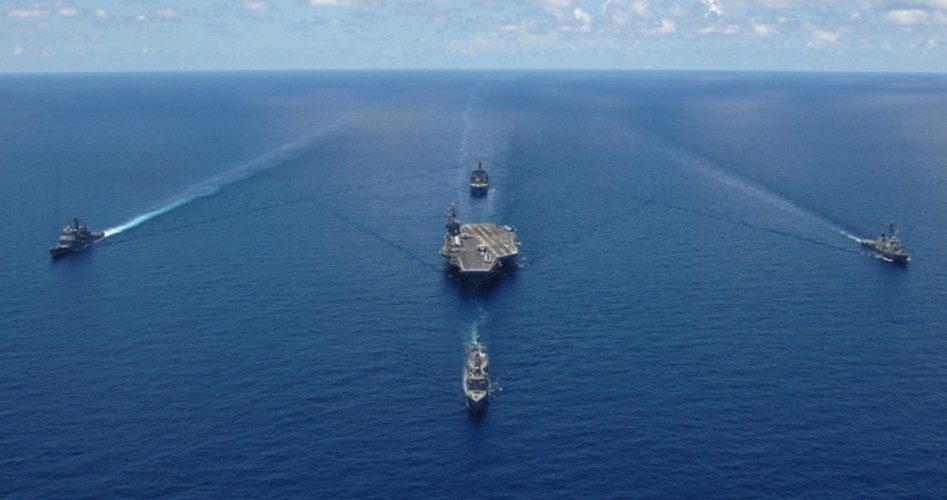
The Nimitz Carrier Strike Group, led by the U.S. aircraft carriers USS Nimitz and USS Ronald Reagan, is conducting naval exercises in the South China Seas.
“Working together with the Ronald Reagan carrier strike group provides advanced, high-end training opportunities that increase our warfighting readiness,” Captain Todd Cimicata, Commander of Carrier Air Wing 17 told Naval News on July 6. “Our operations reinforce the rights, freedoms, and lawful use of the sea and airspace guaranteed by international law.”
China was quick to criticize the U.S. naval exercise, and foreign ministry spokesperson Zhao Lijian stated on July 6 that the exercises were performed “totally out of ulterior motives” and undermined stability in the area.
“Against such a backdrop, the U.S. deliberately dispatched massive forces to conduct large-scale military exercises in the relevant waters of the South China Sea to flex its military muscle,” Zhao said.
U.S. naval ships and planes have periodically conducted exercises in the disputed South China Sea as a way of enforcing freedom of the seas in the area. The Communist government of China has claimed large portions of the sea, but several other nations in the region have disputed China’s claims, among them Brunei, the Republic of China (ROC/Taiwan), Indonesia, Malaysia, the Philippines, and Vietnam.
We reported back in 2016 that the Permanent Court of Arbitration (PCA), an international tribunal in The Hague, had ruled in favor of the Philippines in a maritime dispute with China over that nation’s construction of artificial islands in the South China Sea. The PCA concluded that China has no legal basis to claim rights to the islands, as well as the bulk of the South China Sea.
The United States and China have both conducted naval exercises in the South China Sea, the former as a way of demonstrating sovereignty over the sea and the latter to dispute China’s claims and — as a statement from the U.S. Navy described — to demonstrate “support of a free and open Indo-Pacific.”
Last year, we quoted a report from China’s Maritime Safety Administration stating that China “considers control of the South China Sea as crucial to its foreign trade routes and aspirations to surpass the U.S. as the dominant military power in the Asia-Pacific region.”
An article in Time in 2016 observed, “The U.S. Navy will continue to ply the high seas, acting as the world’s oceanic policeman by engaging in freedom-of-navigation exercises.”
While it is proper for the United States to defend its own interests, including the right to navigate in international waters, the concept of acting as “the world’s oceanic policeman” is the type of interventionism that has embroiled our country in multiple wars over the past 60 years. John Quincy Adams admonished in 1821: “[America] goes not abroad, in search of monsters to destroy. She is the well-wisher to the freedom and independence of all. She is the champion and vindicator only of her own.”
Image: U.S. Navy
Warren Mass has served The New American since its launch in 1985 in several capacities, including marketing, editing, and writing. Since retiring from the staff several years ago, he has been a regular contributor to the magazine. Warren writes from Texas and can be reached at [email protected].
Related articles:
China’s Two New Aircraft Carriers to Take Part in Intimidating War Games
China Conducts Naval Exercises and Ballistic Missile Tests in South China Sea
Tomorrow’s Superpower? China’s Naval Build-up Could Oust U.S. from Pacific
International Tribunal Rules in Favor of Philippines in Dispute With China
China Complains After U.S. Warships Sail Near Spratly Islands
U.S. Warship Sails Near Disputed Island in South China Sea
U.S. and Chinese Carrier Groups Simultaneously Patrol South China Sea


